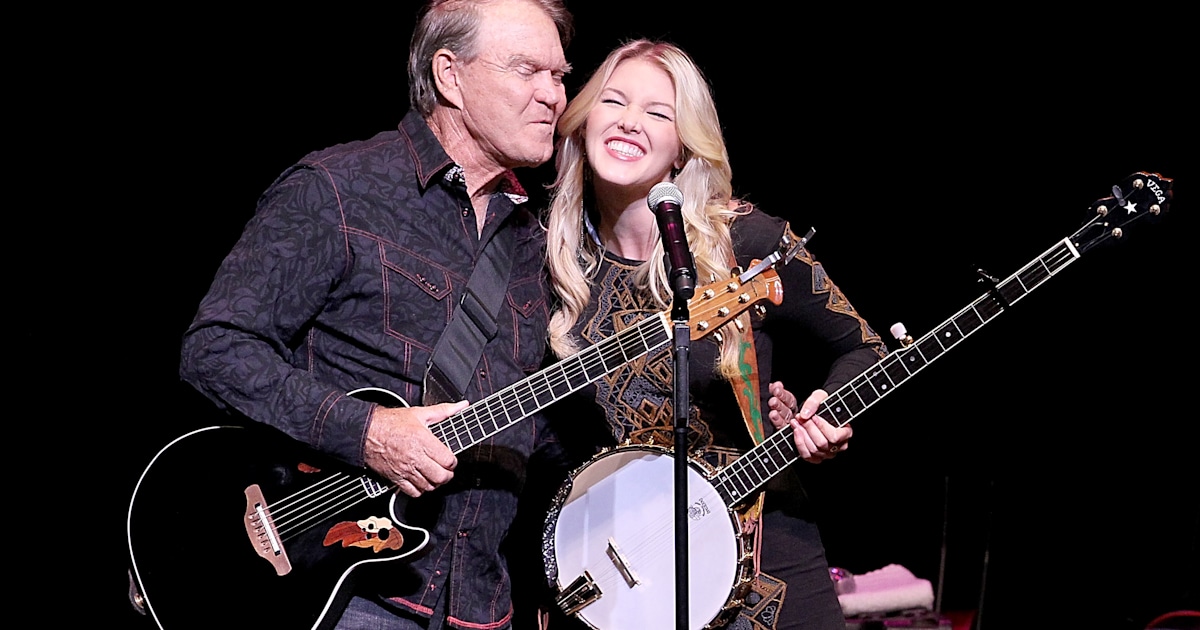“When Glen Campbell Sang With His Daughter, It Was Magic — And A Legacy Came Home”

In a candid night of music and memory, Glen Campbell stepped onto the stage not only as the legendary country star who had sold millions of records, but as a father rediscovering connection. When he sang alongside his daughter — whether Ashley or Debby depending on the performance — the show transformed from a concert into a deeply personal tribute: a passing of torch, a celebration of love, and a reminder of everything that made him extraordinary.
Campbell, whose songs like “Wichita Lineman” and “Gentle on My Mind” cemented his place in music history, had built a career achieving peak artistry, commercial success, and critical acclaim. But in those moments on stage with his daughter, the spotlight softened—allowing the human story behind the legend to shine through.

The performance had all the hallmarks of greatness: Campbell’s rich, resonant voice; the daughter’s banjo or guitar accompaniment; the harmonious interplay between them. But what elevated it into something unforgettable was the sense of family. One recent write-up recalls that during their “Dueling Banjos” set the two traded riffs with fluid ease—her youthful precision complemented his seasoned heart.
For fans and witnesses alike, there was a moment that went beyond performance: Campbell, despite his growing battle with Alzheimer’s, paused mid-song and looked directly at his daughter, smiling softly. She returned his gaze, and the note they played next carried the love, admiration, and bittersweetness of a career winding down—yet still soaring.
His daughter later reflected publicly on what it meant:

“I can’t even put into words how priceless it was for me to be able to perform with my dad… It was so great to watch my dad doing what he loves.”
That honesty reached the audience. People saw more than a legacy act; they saw a father and daughter seizing time in a way that feels sacred. When Campbell was diagnosed with Alzheimer’s in 2011, the reality of what was at stake became heartbreakingly clear. But on stage with his daughter, he was reclaiming something vital: presence, purpose, and love made audible.
There’s also a deeper legacy thread. The moment of duet symbolized the torch passing: Campbell’s daughter stepping into her own voice, his mentoring becoming hers, and his music finding new life in a generational tapestry. She wrote the song “Remembering” in his honor, promising “I’ll do the remembering for both of us.”
And so when you watch that clip—or if you were lucky to see it live—you’re not simply watching old hits performed. You’re witnessing a closing chapter of a legend’s story, paired with a fresh beginning for the next generation. The stage didn’t just belong to Glen Campbell that night—it belonged to them both.
If Glen Campbell is indeed one of the most underrated artists ever, this duet becomes proof of something remarkable: that his greatest legacy wasn’t just a catalog of hits, but a lineage of music, memory, and meaning that tied past, present and future together in a single chord.
Because magic isn’t only what happens in the studio.
Sometimes it happens when a father plays beside his daughter—and for one unforgettable performance, the world stopped listening to the hits and started hearing the heart.





